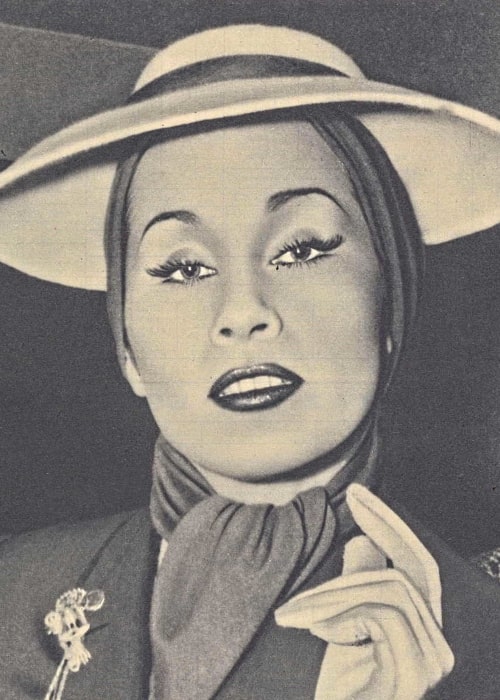| Yma Sumac Quick Info | |
|---|---|
| Height | 5 ft 5 in |
| Weight | 57 kg |
| Date of Birth | September 10, 1922, or September 13, 1922 |
| Zodiac Sign | Virgo |
| Date of Death | November 1, 2008 |
Yma Sumac was a Peruvian coloratura soprano who gained global acclaim with her wide vocal range as well as established herself as one of the most famous exponents of exotica music during the 1950s. She also became one of the best-selling Latin Americans in history and the best-selling Peruvian in history. Yma Sumac’s discography consists of albums such as Voice of the Xtabay, Inca Taqui, Legend of the Sun Virgin, Legend of the Jivaro, Fuego Del Ande, Mambo!, and Miracles.
Born Name
Zoila Augusta Emperatriz Chávarri del Castillo
Nick Names
Yma Sumac, The Peruvian Songbird, Imma Sumack (also spelled Ima Sumack)

Age
She was either born on September 10, 1922, or September 13, 1922.
Died
On November 1, 2008, Yma Sumac died of colon cancer at the age of 86 at an assisted living home in Los Angeles, California, United States.
Resting Place
Hollywood Forever Cemetery, Los Angeles, California, United States
Sun Sign
Virgo
Born Place
Perú
Residence
She resided in Los Angeles, California, United States.
Nationality
Occupation
Singer, Artist
Family
- Father – Sixto Chávarri (Civic Leader)
- Mother – Emilia del Castillo (School Teacher)
- Siblings – She had 5 older siblings.
- Others – Cholita Rivero (Cousin) (Musician, Dancer)
Genre
Exotica, World, Mambo, Lounge
Instruments
Voice, Sopranino, Soprano, Mezzosoprano, Contralto, Tenor, Baritone, Bass
Build
Slim
Height
5 ft 5 in or 165 cm
Weight
57 kg or 125.5 lbs
Boyfriend / Spouse
Yma Sumac had dated –
- Moisés Vivanco – She got married to Moisés Vivanco on June 6, 1942, and their only child, a son named Carlos, was born in 1949. Yma Sumac and Moisés Vivanco toured South America and Mexico as a group of 14 musicians named Imma Sumack and the Conjunto Folklorico Peruano. Their marriage ended in divorce.
Race / Ethnicity
Mixed
Hair Color
Dark Brown
Eye Color
Hazel
Sexual Orientation
Straight
Distinctive Features
- Had one of the widest vocal ranges and could emit notes from above a coloratura soprano to the low notes of a bass
- Singing voice ranged from B2 to G♯7
- Was able to do the triple coloratura or the trill of the birds
Yma Sumac Facts
- Her stage name came from her mother’s name which was derived from “ima shumaq” (Quechua for “how beautiful!”). However, at the beginning of her career, she used to claim in interviews that the name meant “beautiful flower” or “beautiful girl”.
- Yma Sumac’s debut studio album Voice of the Xtabay was released in 1950 via Capitol Records. It included songs like Lure of the Unknown Love (Xtabay), Chant of the Chosen Maidens (Accla Taqui), Monkeys (Monos), Dance of the Winds (Wayra), and Dance of the Moon Festival (Choladas).
- In the 1950s, there were claims that she was an Incan princess who was directly descended from Atahualpa (the last Inca Emperor). The government of Peru also formally supported the claim in 1946. However, the claim was not true according to her biographer Nicholas E. Limansky who stated, “Hollywood took this nice girl who wanted to be a folk singer, dressed her up and said she was a princess. And she acted like it.”
- Her 5th studio album Mambo! was released in 1954 through Capitol Records.
- Describing Yma Sumac’s voice in 1954, composer and music critic Virgil Thomson said that her voice was “very low and warm, very high and birdlike,” noting that her range “is very close to five octaves, but is in no way inhuman or outlandish in sound.”
- She was awarded a Star on the Hollywood Walk of Fame for Recording at 6445 Hollywood Boulevard in Hollywood, California.
- Yma Sumac was honored with the Orden del Sol award by Peruvian President Alejandro Toledo and the Jorge Basadre medal by the Universidad Nacional Mayor de San Marcos in 2006.
- In honor of the 100th anniversary of her birth, a new memorial bust statue was unveiled at her final resting place at the Hollywood Forever Cemetery on September 20, 2022.
Featured Image by Foto Brosio / Italian magazine Radiocorriere / Public Domain
